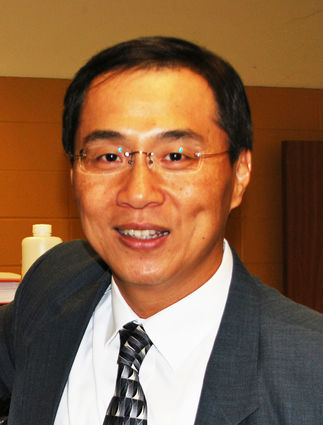LU lecture series presents Jerry Lin
Last updated 10/10/2014 at Noon
Lamar University has honored Jerry Lin, professor of environmental engineering, as the Distinguished Faculty Lecturer for 2014. “Chasing Quicksilver: From an Emperor’s Tomb to the Global Environment” will be the topic of his lecture, sponsored by ExxonMobil, to be presented Oct. 20 at 7:00 p.m. in the University Theatre. The Lamar University Faculty Senate will host the lecture, which is open to the public without charge.
Lin is the 28th recipient of the honor – one of the highest accorded a Lamar faculty member. A committee of faculty, staff, students and community representatives make the selection. Lin has been a member of the Lamar faculty since 1999.
He wrote in his proposal: “The lecture will present a historical overview on the relationship between human activities and mercury distribution in the environment. The presentation will be a lively, entertaining session that details the discovery and industrial use of mercury, the release of mercury into the environment and its associated impacts. Also discussed will be the biogeochemistry of mercury pollution in a global context and the science-based policy implications of a global pollutant such as quicksilver.”
Lin was named the 2008 University Scholar and the 2012 University Professor and Ann Die-Hasselmo Faculty Scholar. He was the receipient of the Chi-Epsilon, the civil engineering honor society, James M. Robbins Excellence in Teaching Award in 2008. Lin received his Bachelor of Science degree in chemical engineering at Tatung University (Taipei, Taiwan) in 1991, Master of Science in environmental engineering at Duke University in 1995, and the doctorate degree at the University of Cincinnati in 1998.
After one year of postdoctoral research experience at the US Department of Energy Oak Ridge National Laboratory, he joined the engineering faculty at Lamar University in 1999. Lin is a registered professional engineer in environmental engineering.
His areas of expertise include fate and transport of atmospheric mercury, water and wastewater engineering and air quality assessment. He is a principal investigator for 55 environmental research projects in excess of $5.5 million funded by National Science Foundation, U.S. Environmental Protection Agency (USEPA), Department of Defense, Department of Agriculture, Texas Commission on Environmental Quality and industrial partners. Lin has authored or co-authored more than 80 peer-reviewed publications in environmental mercury, air pollution and water quality, which have been cited more than 2,000 times in refereed journals.
Lin has given 50 invited talks, two of which were keynote addresses, and more than 100 technical presentations in international conferences and received a number of research awards. Lin serves as a member in the USEPA Science Advisory Board and the Texas Deapartment of Transportation Technical Advisory Panel. He also works extensively with refinery and paper industries in a number of waste-to-energy, biological wastewater treatment and emission control projects. In addition to his research, Lin is a recognized teacher and an active proponent of STEM, (science, technology, engineering and mathematics) education through his research activities and educational outreach.
Lin is a world-renowned researcher in environmental mercury. His work in the chemistry and modeling of atmospheric mercury provides important insights to the fate and transport of mercury in the global environment. The kinetic and mechanistic parameters of mercury reactions he proposed are widely implemented in regional and global atmospheric models.
His critical analysis on the scientific uncertainties of mercury models has led to new efforts in bridging the knowledge gap.
In recent years, his research focused mainly on improving the estimate of air-surface exchange of mercury vapor over natural surfaces through isotopic tracing techniques and methodology development.
Lin has assisted in the technical analysis for national policy making on mercury emission reduction including Clean Air Mercury Rules (2005), Occupational Mercury Exposure Assessment (2010) and Mercury and Air Toxics Standards for Power Plants (2011).
He is also one of the lead mercury modelers of the United Nations' Task Force on Hemispheric Transport of Air Pollutants (2010).
Catalina Castillon, assistant professor for English and Modern Languages, was the 2013 Distinguished Faculty Lecturer.
Other honorees have been James Esser, psychology; Donna Birdwell, anthropology; Keith Carter and Jerry Newman, art; Richard Harrel, biology; George Irwin, physics; Rafael Tadmor, chemical engineering; Jean Andrews, deaf studies/deaf education; Jim Jordan and Jim Westgate, earth and space sciences; R.S. “Sam” Gwynn and Jim Sanderson, English; Kenneth Rivers, French; William Pampe, geology; John Carroll, Ronald Fritze, John Storey, J. Lee Thompson and Naaman Woodland, history; Dianna Rivers, nursing; Joe Pizzo, physics; Terri Davis, political science; Dorothy Sisk, professional pedagogy; and Christine Bridges-Esser, Spanish.







Reader Comments(0)